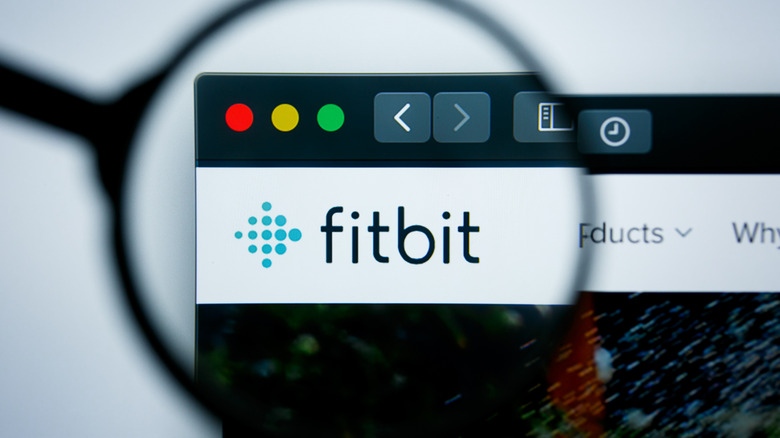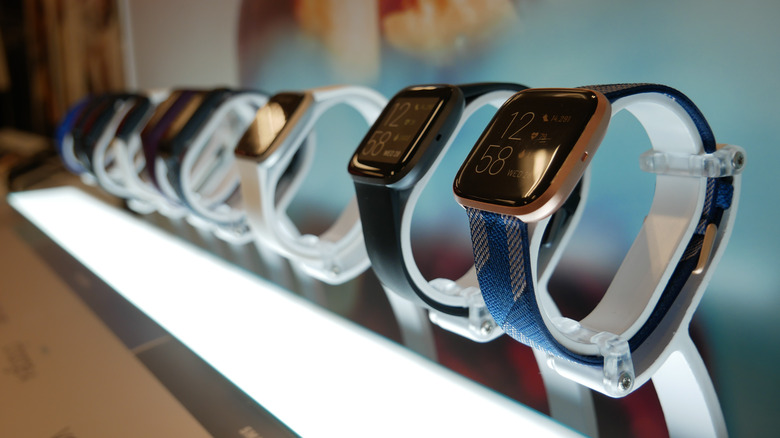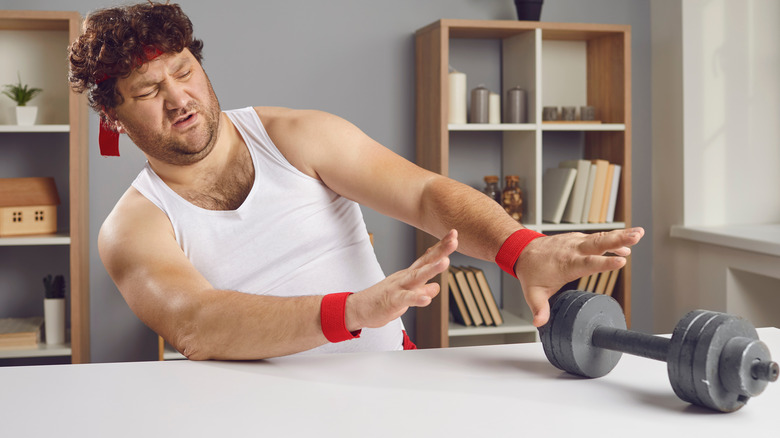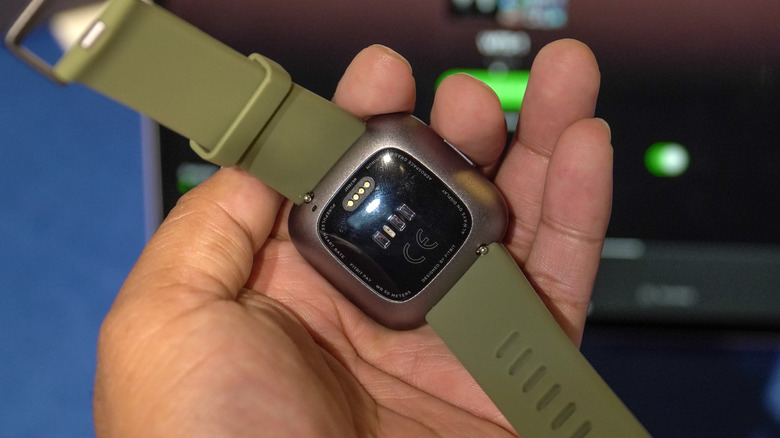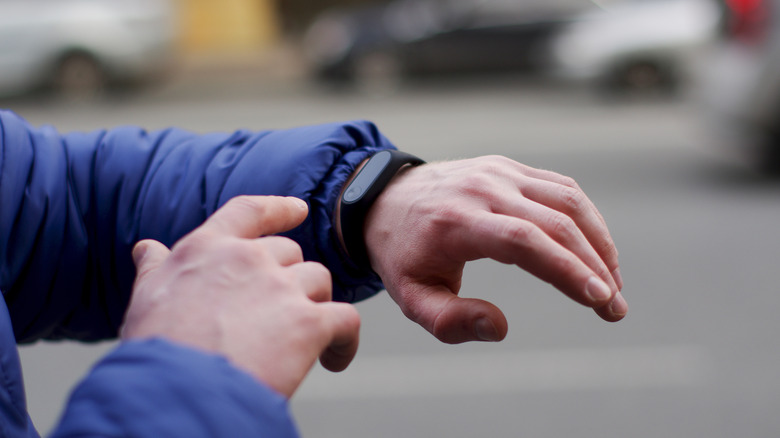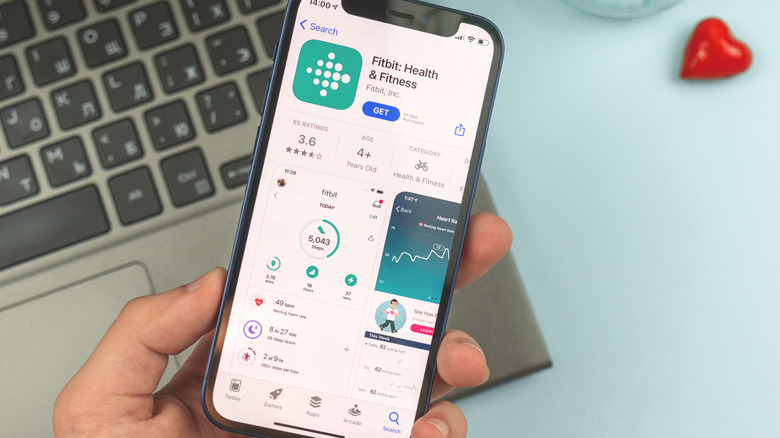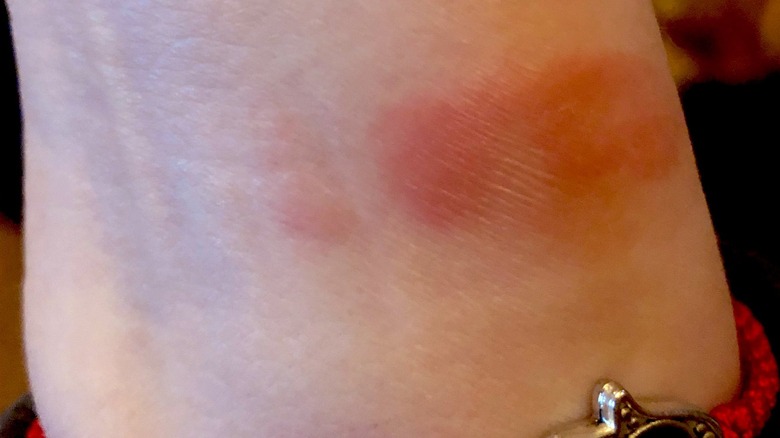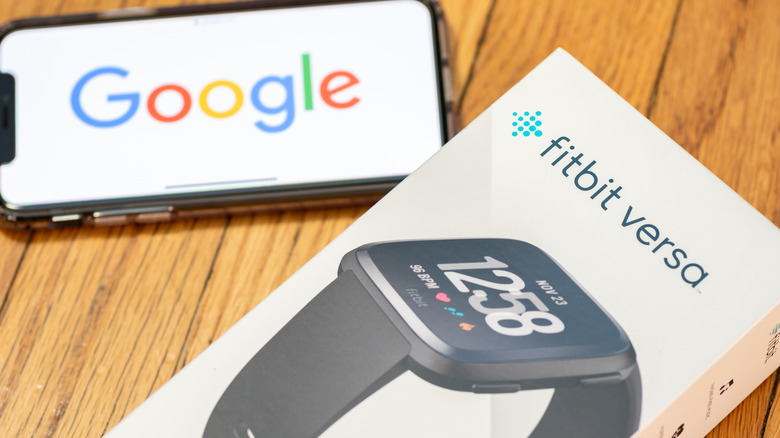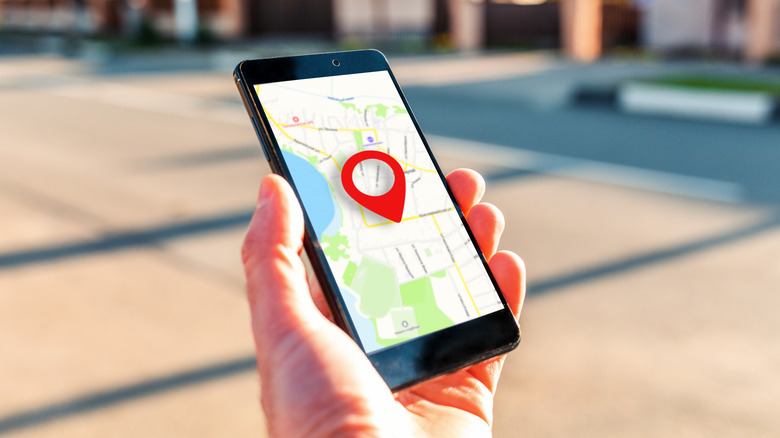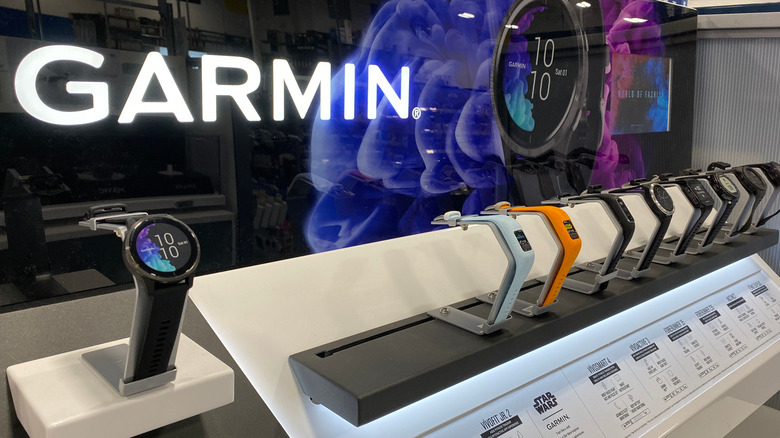The Truth About Fitbit
We may receive a commission on purchases made from links.
Ever wonder what it would be like to have a constant readout of your overall health? Look no further than a Fitbit, a wearable device that's almost like having a daily doctor's visit right on your wrist.
While it can't tell you everything your doctor could about your health, it definitely has a lot of convenient features that can help you understand more about it. For instance, the latest trackers offer stress management and monitoring, heart health trackers, activity trends, and more data and tools to keep you on track with your fitness and health (per Fitbit). And with such a variety of styles and models to choose from, you can probably find one that has what you need and stays within your budget.
Best of all, wearing a Fitbit really could boost your wellness. A 2019 study published in PLoS Medicine found that pedometers can give people long-term health benefits. Well, as it turns out, as a primary Fitbit feature is step tracking.
But are these devices everything they're cracked up to be? Keep reading to learn more about how Fitbit affects motivation, helps solve crimes, and has even found itself in some legal hot water.
The company took off quicker than expected
Fitbit was founded in 2007, right around the same time that Facebook and the Apple iPhone rose to power. Who would have thought that a watch could be so smart that it tracks your every move — literally — and monitors your overall health? Yet, that was exactly what Fitbit promised its customers.
Founders James Park and Eric Friedman conceptualized Fitbit as a wearable device that did much more than tell time. In 2008, Park and Friedman presented their idea at a technology conference, not expecting to acquire an astounding number of preorders for the device. Imagine their shock when preorders soared to 2,000 in just one day. Fitbit took off quickly after the initial bottleneck of supply and demand, as the founders searched for manufacturers for their first Fitbits. By the end of 2009, a stream of orders came pouring in (via Wareable).
By 2014, Fitbit was a leader of the activity tracker industry, grabbing about 67% of the market with its wearables (per Wired).
Your Fitbit could motivate you to get moving
A primary reason people wear Fitbits is to stay motivated to get healthier, whether by tracking their fitness activity or monitoring their stress and sleep patterns. Some research suggests that Fitbit could be beneficial in boosting motivation.
A 2015 study published in the American Journal of Preventative Medicine found that its participants — 51 postmenopausal women who led inactive lives — increased the amount of moderate to physical activity they did by 62 minutes a week after one month of wearing a Fitbit tracker. Lead study author Lisa Cadmus-Bertram tells The Guardian, "Fitness trackers combine the key ingredients for motivating people to reach their health goals, [such as] self-monitoring, setting goals, getting frequent feedback on your progress, revising goals as needed, social support and developing a sense of self-efficacy."
A scientific review published in a 2019 edition of the American Journal of Medicine found that although wearable devices like Fitbit did not significantly affect wearers' health, they can motivate people to get more physical activity into their routines.
Or it could make you feel less motivated
While some Fitbit wearers could get some motivation from their fitness tracker to be more active and monitor their health stats, others could find that their watch makes them less likely to stay on track.
One study published in a 2017 edition of the International Journal of Health Promotion and Education explored the relationship between fitness trackers and physical activity in adolescents. The participants, aged 14-15 years old, wore a Fitbit for five weeks along with an accelerometer before and after the five-week period to gauge physical activity levels. After the study period, the adolescent participants completed questionnaires about their physical activity motivation. The results showed that the adolescents "engaged in significantly less moderate to vigorous physical activity after wearing the Fitbit," had reduced autonomous motivation, and experienced increased amotivation.
As the researchers explained (via TechCrunch): "It was consistently reported that after about four weeks, pupils became bored with the Fitbit. This evidence suggests that though the Fitbit serves to promote physical activity, for the pupils in this study, the Fitbit may have only produced modest and short-term effects."
Fitbit wearers are not happy about their watch bands
A Fitbit is designed to be worn at all times — even when you sleep, if your Fitbit has sleep-tracking features — but you might find that it doesn't stay in place like you expect it to.
At least, that's what a class action lawsuit said in 2019. The suit alleged that Fitbit failed to listen to any complaints about its bands not clasping properly, causing the devices to fall off wearers' wrists, sometimes even damaging or losing the trackers. According to ClassAction.org, the plaintiff, Baron Willis, had Fitbit replace his Fitbit four times for problems relating to the band, but after asking for a fifth replacement, the company only directed him to discounted devices to purchase. Through the lawsuit, Willis sought damages not just for himself but also for other Fitbit wearers whose devices saw a similar fate.
In the latest update in January 2020, the court allowed Fitbit to "compel arbitration and to dismiss or stay the action," effectively putting the proceedings on hold while the plaintiff and defendant moved toward a resolution (via Casetext).
Your Fitbit may not be as accurate as you think
When you buy a fitness tracker like Fitbit, you expect it to be relatively accurate in tracking the metrics it's designed to track, like your sleep pattern, steps, and heart rate. However, Fitbit has come under fire for some inaccuracies, ultimately leading to a class action lawsuit.
One of the most common metrics to track with a fitness tracker is heart rate. But in 2016, Fitbit was called out in the lawsuit for its allegedly inaccurate heart rate tracking, as noted in a study (via Business Wire) led by California State Polytechnic University researchers. The study found that when compared with time-synchronized ECG readings, the included Fitbit devices did not track heart rate correctly, leading to about a 20 beat-per-minute difference with ECG results, on average.
In 2018, Fitbit filed to dismiss the lawsuit, stating that it doesn't claim accuracy in its advertising in response to false advertising claims mentioned in the lawsuit. However, the court clapped back: "[The] facts indicate that the devices lack even a basic degree of fitness for use as exercise or activity monitors" (via Business Wire).
Fitbit trackers could detect long-term COVID symptoms
Long-term COVID — also known as long-haul COVID – causes post-COVID health problems that could linger for weeks, months, or longer after having COVID-19. Symptoms may include fatigue, loss of taste or smell, memory or sleep problems, elevated heart rate, shortness of breath, and dizziness (per Mayo Clinic).
Your Fitbit could be helpful in detecting some post-COVID changes in your body, especially relating to resting heart rate and sleep. A 2021 study published in JAMA Network Open compared Fitbit data between COVID-positive and COVID-negative individuals. Researchers found that the resting heart rates, activity levels, and sleep patterns of COVID-positive individuals took longer to go back to normal than those of COVID-negative participants. Also, COVID-positive individuals who experienced bradycardia and tachycardia saw an average of 79 days after their first symptom onset for these conditions to return to normal levels. Some participants even had elevated heart rates for more than 133 days, somewhat giving a glimpse into how COVID-19 can cause prolonged health effects on those infected.
Fitbit's data could solve crimes
According to Fitbit's privacy policy, your Fitbit data is primarily used to do things with your Fitbit, like create an account to track your health data and find personalized recommendations. An Avast article sheds a little more light on all the potential information your Fitbit could provide, like health data for employee wellness programs or personal information for connections to your social media accounts or third-party apps. In other words, your Fitbit could know more about you than you might think. Interestingly, it might even know enough about its wearers to help solve crimes.
In 2014, the first known court case involving data from a Fitbit arrived in a Canadian courtroom. According to The Atlantic, the plaintiff's lawyers used Fitbit data to prove a correlation between their client's previous injury and decreased activity levels.
Other cases using Fitbit information have occurred since. In 2018, Fitbit data helped police discover that a murder victim's heart rate spiked before her murder and quickly decreased right before her soon-to-be-convicted murderer left her home (per The New York Times). In 2021, an alleged murderer's Fitbit data was allowed as evidence in court without expert testimony to show that the accused's few tracked steps during the time of the murder didn't match up with expectations. It was partly this evidence that moved the investigators' focus to the later-convicted perpetrator (via Wisconsin State Public Defender).
1.7 million Fitbits could be burn hazards
In March 2022, Fitbit recalled 1.7 million of its devices due to a potential burn hazard relating to the lithium-ion battery that powers them. The recall focuses only on Fitbit's Ionic Smartwatch, which had more than one million sales in the United States. Fitbit says that it produced these watches between 2017 and 2020.
According to NPR, more than 170 global reports sparked the recall, stating that users suffered burn injuries where they wore their Fitbits. Six of those injuries resulted in second- or third-degree burns.
Although Fitbit stated that the burn hazards occurred "in very limited instances," it does suggest that users stop using their Ionic Smartwatches to err on the side of caution. However, since the company is no longer making this particular model, customers with one can receive a full refund by beginning the process online. Ionic Smartwatch users can also get access to a discount on future Fitbit devices through the refund process.
Fitbit trackers were spotlighted on a popular reality TV show
If you're a die-hard fan of Big Brother — a show that lets viewers watch every move the houseguests make while they form alliances and break promises to one another — you may have noticed season 16's houseguests sporting Fitbits. This was a strange addition to the Big Brother game, as houseguests are usually not able to have any kind of technology inside the house (via Men's Health).
At first, the reason for gifting the houseguests these new accessories was unclear to viewers. Later, host Julie Chen announced that the houseguests with the least amount of activity logged on their Fitbits would become "have nots" for the week. In Big Brother, a "have not" has to sleep in a not-so-cozy room and doesn't get the same food choices as other housemates (per Technically Well).
According to Reality Blurred, viewers could also visit the Big Brother website to see who was staying active in the house, giving them yet another way to keep tabs on their favorite players.
Your Fitbit could accurately detect heart problems
While Fitbit has had its share of mishaps with accurate tracking for some data points, it's also proven itself to excel in other areas.
In 2020, Fitbit launched a large-scale clinical trial to determine the accuracy of its atrial fibrillation detection. The clinical trial looked for Fitbit wearers 22 and older with no prior history of the condition, which is characterized by irregular heart rhythm. In addition, participants would receive a free telehealth visit to confirm any atrial fibrillation detection. Fitbit researcher Tony Faranesh tells MobiHealthNews that Fitbit hoped the trial would indicate that fitness tracker monitoring can be just as effective as clinical diagnostics at detecting this particular cardiovascular problem.
In 2021, the results were in: Fitbits could detect about 98% of atrial fibrillation cases accurately. Additionally, many of the undiagnosed episodes happened when wearers slept, "and we suspect that these episodes were asymptomatic," explains Harvard Medical School associate professor of medicine Steven A. Lubitz (via Practical Cardiology).
Fitbit is now one of Google's many ventures
As Fitbit became larger and more popular, it caught the attention of a global brand that's a household name: Google. In late 2019, Google announced that its parent company, Alphabet, would be buying Fitbit at a value of about $2.1 billion. Google paid $7.35 per share of the company. According to its hardware chief Rick Osterloh, Google's hope was that combining forces with Fitbit would allow both companies to merge into a leading technology innovator to put the best software and features possible into the fitness trackers (via CNBC).
However, the acquisition made people around the world hesitant. Would Google's takeover allow it access to Fitbit users' data that they once thought was secure, and would it create a difficult-to-compete-in market? As a Google spokeswoman explained (via Reuters): "This deal is about devices, not data. We believe the combination of Google's and Fitbit's hardware efforts will increase competition in the sector." Still, Reuters reports that 20 advocacy groups across the globe signed a joint statement about their concerns in 2020.
Osterloh addressed the data concern in a blog post in November 2019, stating, "Fitbit health and wellness data will not be used for Google ads. And we will give Fitbit users the choice to review, move, or delete their data."
U.S. soldiers wearing Fitbits have shared sensitive information
In 2018, The Washington Post published an article that unraveled some potentially unsettling information about the U.S. military: Service members were possibly giving away the locations of U.S. military bases with their fitness trackers. The article explains that Strava, a GPS tracking service, publishes a heat map showing activity where people use fitness trackers like Fitbit. Although the heat map isn't in real-time, it does note activity over the past year.
The problem is that areas of the map that show little to no activity can easily highlight areas where U.S. military bases might be. This realization is based on small hotspots of activity in otherwise isolated areas in countries of military presence, like Afghanistan or Iraq. While a U.S.-led coalition statement explains that rules were in place to govern technologies like fitness trackers, they reportedly were not enforced properly (per The Washington Post).
Later that same year, news broke from the Pentagon that fitness trackers like Fitbit would no longer be allowed for deployed service members. According to the statement (via MilitaryTimes), "The rapidly evolving market of devices, applications, and services with geolocation capabilities presents a significant risk to the Department of Defense personnel on and off duty, and to our military operations globally."
Fitbit makes more than fitness trackers
Toward the beginning of the COVID-19 pandemic, Fitbit decided to lend a hand by putting its tech-focused talents to work. Rather than focusing solely on its fitness tracking devices, Fitbit released the Fitbit Flow, a ventilator designed for affordability and convenient use when more expensive devices may not be as easily accessible (via The Verge). And at the beginning of the pandemic, the shortage was a real problem. GlobalData reported a shortage of about 880,000 ventilators worldwide, 75,000 of which were needed in the United States.
Fitbit's ventilator received emergency approval from the FDA, making it available for use during the COVID-19 pandemic only. Fitbit CEO and co-founder James Park said in a statement that Fitbit created the Flow because the company "saw an opportunity to rally [its] expertise in advanced sensor development, manufacturing, and [its] global supply chain to address the critical and ongoing need for ventilators and help make a difference in the global fight against this virus." However, the ventilator was more of a backup device, only going to work when traditional commercial ventilators were not readily available.
Fitbit paved the way for other fitness trackers
Fitness trackers aren't necessarily a new phenomenon. Remember pedometers, anyone? But the tech-forward, innovative trackers we have now are certainly boosting how much people learn about themselves, their activity levels, and their overall health.
And Fitbit may be able to take most of the credit for starting the craze. After all, it was one of the first to "garner mainstream attention," Lifewire reports. What began as a simple clip-on device soon grew to become a lineup of multiple fitness tracker models that added helpful tools, like heart rate monitoring and sleep tracking.
With the popularity of the Fitbit on the rise, other companies found themselves creating their own devices. Soon came Samsung and Apple with their smartwatches that combined time-telling with fitness tracking, texting capability, and so much more. And then there's Garmin, Amazon's version of a smartwatch/fitness tracker, which is available in multiple models and styles to fit just about any wearer's preferences.
Although Fitbit's wearable market share has been overshadowed by other brands in recent years (via Canalys), that shouldn't downplay the fact that the company pioneered the fitness tracker movement.

